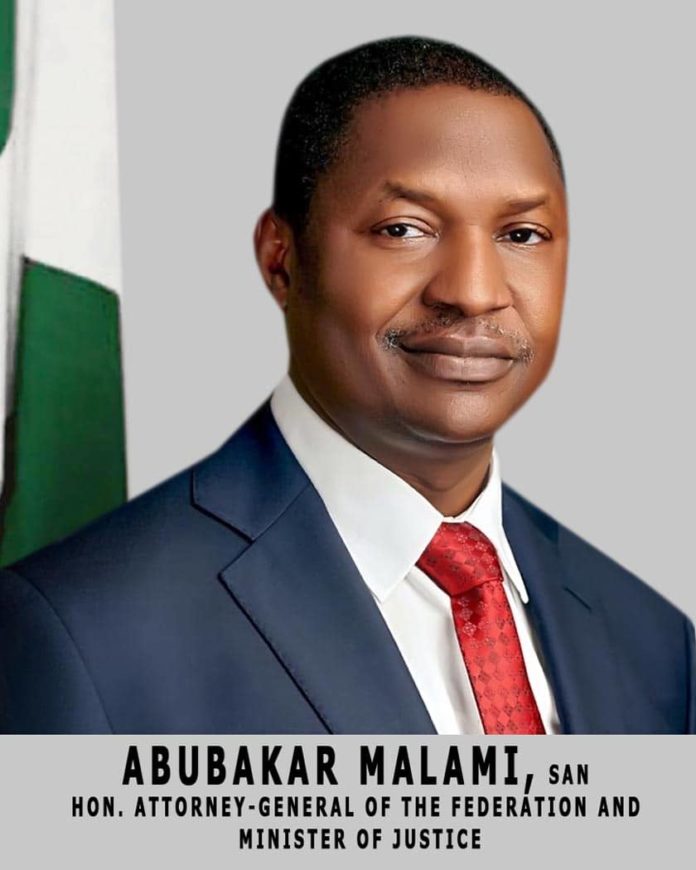Preamble
Following the signing into law of the Nigerian Correctional Service Act (NCSA) 2019, the Federal Ministry of Justice in collaboration with the Presidential Committee on Correctional Service & Reform, the Federal Ministry of Interior and the Nigerian Correctional Service convened a 3-day workshop for critical stakeholders saddled with the responsibility of implementing the NCSA. The NCSA 2019 replaces the Prison Act (PA) Cap. P29 Laws of the Federation of Nigeria, 2004. The NCSA addresses the shortcomings of Prison Act.
The aim of the workshop was to:
a. Sensitise stakeholders on the salient provisions of the NCSA, and
b. Develop a road map/Strategic Action Plan (SAP) for the effective implementation of the provisions of the Act especially with regard to Non – Custodial Measures across the country. The SAP stipulates immediate, short, medium and long term measures required for the implementation of the Act.
The workshop brought together relevant stakeholders in the administration of criminal justice both at the Federal and State levels including Judges, Magistrates, Attorneys-General, Federal Ministry of Interior Nigerian Correctional Service Officials, Law Enforcement Agencies, Rule of Law Experts, CSOs, CBOs & NGOs as well as other stakeholders from the six geo-political zones. Other participants include the United Nations Specialised Agencies, the European Union and Development partners.
The workshop was supported by the UN, EU, UNHCR and the US Embassy.
There was exhaustive deliberation on the following sub-themes:
*Overview of the Correctional Service Act, 2019
*Non-custodial measures (Restorative Justice, Community Service, Administration of Juvenile Justice & Women Prisoners, Rehabilitation & Re-integration)
*International Best Practices in Non-Custodial Measures: The Canadian Model, etc.
*Understanding Custodial Service: Legal & Institutional Framework under the Nigerian Correctional Service Act, 2019
*Gender Specific Issues for Women in Detention
*Juvenile Offenders Under the Nigerian Correctional Service Act, 2019 in comparison with the Child Rights Act, 2003 & ACJA, 2015
*The Detention of Awaiting Trial Persons: The Nigerian Correctional Service Act, 2019 as a Tool for Decongestion – Challenges & Prospects
OBSERVATIONS
The workshop observed as follows:
1) There is the urgent need for the development of implementation strategies for the NCSA 2019.
2) The state governments need to be involved in the implementation of the NCSA 2019.
3) The implementation of the NCSA 2019 requires sufficient funding
4) The roles of Non-Custodial Officers in parole, community service, probation, restorative justice etc. are not clearly defined.
5) There is the need for continuous synergy and collaboration amongst the NCS, the Presidential Committee on Correctional Service Reform and Decongestion and other stakeholders towards effective implementation of the NCSA 2019.
6) Currently, Correctional Service Officers do not have the requisite training and on-the-job experience to cope with the enormous responsibilities bestowed on them in the NCSA 2019 in the area of non-custodial measures hence the need for in-depth training.
7) The NCSA needs a new ‘home’, under a ‘Correction Board’?
8) NCS currently houses male and female inmates in the same facility in separate Units, hence the need to revisit issues bordering on classification of Correctional Centres and inmates.
9) There is no forum or platform that would ensure the implementation of the recommendations from this workshop.
10) The NCS remaining on the exclusive list may not serve the best interest of the Country.
11) There is no up-to-date central database on persons in various detention centres in Nigeria?
12) There is a dearth of new Sentencing guidelines on non-custodial sentence in line with the provisions of NCSA 2019.
13) Certificate of good behavior should amount to ‘something’.
14) The Child Rights Act, 2003 and the ACJA, 2015 are not yet harmonised with NCSA 2019.
Recommendations
1. There should be an Implementation Strategy for the Nigerian Correctional Service Act, 2019.
2. The National and state Committees of the Non-custodial service should be appointed and constituted by the Executive and Legislative arms without further delay.
3. There should be periodic interface amongst the Honorable Attorney-General of the Federation and Minister of Justice, Minister of Interior, the Controller-General of the NCS as well as other critical stakeholders at the Federal and State levels towards the implementation of the non-custodial measures under the NCSA, 2019.
4. The Correctional Service may appoint a Change Consultant to guide on appropriate infrastructural, human resource and operational plans as well as monitor the activities of the Correctional Service to give feedback to Government for necessary evaluation with regard to non-custodial measures.
5. A blueprint for proper funding through a special intervention fund for the takeoff of the Act should be initiated by the Change Consultant for the Ministers of Interior and Justice to place before the government. The Blueprint should identify tools required by judicial and correctional service officers to implement the Act
6. The non-custodial Service Officers should be present and have an office in every court to report on potential cases for pre-trial, probation and parole for Judges to decide. The officers should liaise with Police and community component to ensure the execution of Non-custodial sentences passed by the Judge
7. The Controller General of Correctional Service should work out modalities for collaborating with the Presidential Committee on the Decongestion of Correctional Centres, the Bank of Industry, Ministries of Industry Trade and Investment, Agriculture, the Central Bank etc. under the leadership of the Ministry of Interior to attract top international investors to tap from opportunities in Correctional Service Agric farms and Correctional Service industries for the production and Processing of Agro products, textiles, military uniforms etc. as a platform to support community service and other non-custodial measures
8. The Controller General should establish more modern skills acquisition centers, Borstal institutions, Correctional farms and Correctional industries in every state of the federation in collaboration with other stakeholders.
9. The need for intensive training of the Correctional Service Personnel and improving their conditions of service including the payment of special allowances to boost their capacity.
10. The time has come for a conversation or objective assessment on whether the Nigerian Correctional Service should remain under the Ministry of Interior, have its own Ministry, moved to the Ministry of Justice or under the Presidency.
11. The Controller-General of the NCS should, as a matter of urgency, properly designate separate male and female Borstal training institutions for Juvenile offenders
12. Social media platforms should be set up for the Monitoring and Evaluation (M&E) of the recommendations from this workshop.
13. The NCS should be removed from the exclusive to the concurrent list.
14. There is an urgent need to generate data on the persons in detention facilities all over Nigeria.
15. The need to apply plea bargain in states where ACJA has been domesticated with reference to awaiting trial inmates
16. New sentencing guidelines are required for non-custodial sentence as a pilot scheme in the FCT and updating of the Standing Orders to reflect the provisions of the NCSA, 2019.
17. International agencies, especially the United Nations need to support the capacity building of Correctional Officers. UN experts should be embedded in the implementation process of the Act for comparative experience.
18. ‘Certificate of good behavior’ should translate into recommendation for ‘pardon’ and ‘clemency’.
19. There is the need for the harmonization of the Child Rights Act 2003, the ACJA, 2015 and the NCSA 2019.
Dated this 27th day of November, 2019.
ABUBAKAR MALAMI, SAN
Attorney-General of the Federation
and Honourable Minister of Justice






